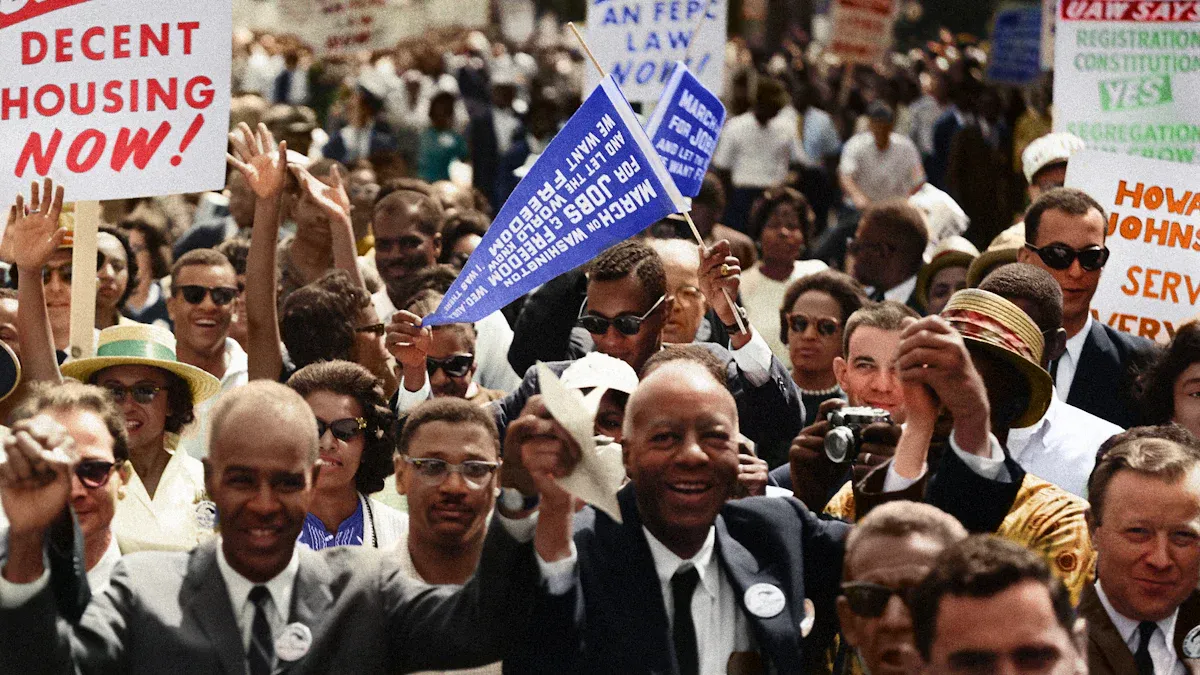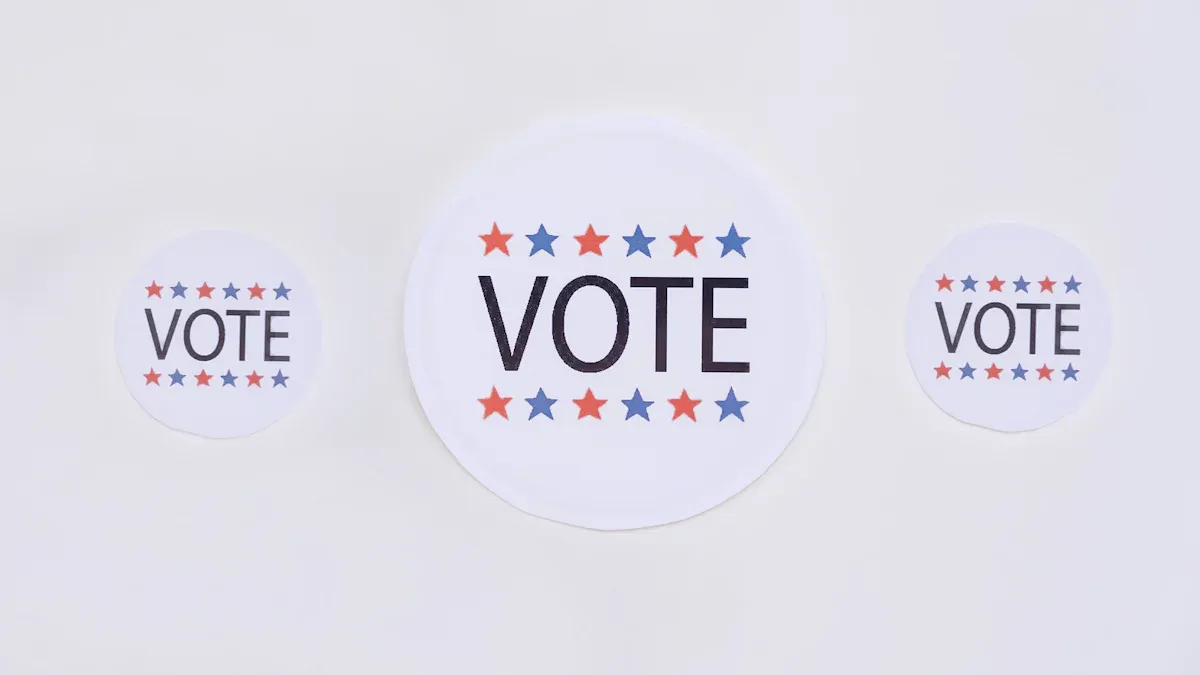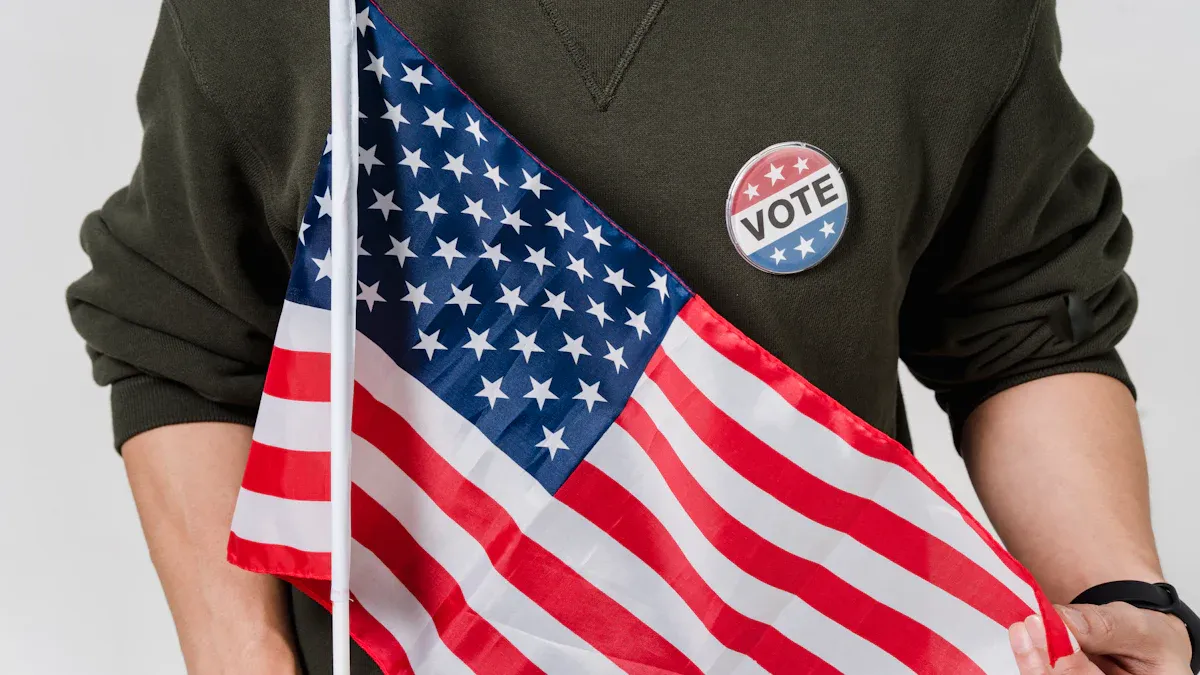- EasyCard
- Trade
- Help
- Announcement
- Academy
- SWIFT Code
- Iban Number
- Referral
- Customer Service
- Blog
- Creator
Green Card Holders and US Elections Your Complete Guide to Voting Rights

Image Source: unsplash
Green card holders make up about 4% of the U.S. population, but you have no right to vote in U.S. elections. Only U.S. citizens can participate in these elections. Many people believe that holding a green card gives you the same rights as citizens, but this is a common misconception. You may enjoy many benefits, yet voting is not one of them. Even rare exceptions for non-citizen voting almost never include green card holders. Understanding your rights and responsibilities remains critical for civic participation and engagement. Illegal participation can bring serious legal consequences.
Remember: Civic participation and engagement matter, but always stay within the law as a green card holder.
Key Takeaways
- Green card holders cannot vote in federal, state, or most local elections; only U.S. citizens have this right.
- Trying to vote illegally can lead to serious penalties like fines, jail time, and deportation, so always follow the law.
- Green card holders have many rights, such as working and living in the U.S., but voting and running for office are reserved for citizens.
- You can still engage in your community by volunteering, attending events, and supporting causes without voting.
- Applying for U.S. citizenship opens the door to full voting rights and greater participation in American democracy.
Green Card Holders Vote: The Rules
Can Green Card Holders Vote?
You may wonder, can green card holders vote in the United States? The answer is almost always no. Green card holders cannot vote in federal, state, or most local elections. Only U.S. citizens have the right to vote in these elections. This rule is clear and strict. If you hold a green card, you face many restrictions when it comes to voting.
Some people ask, who can vote in the US? The law says only citizens can vote in federal, state, and most local elections. Green card holders vote only in extremely rare cases. A few local governments allow noncitizens to vote in certain elections, but these exceptions are very limited. You should always check the rules in your city or town before you try to vote.
Here is a table showing where green card holders vote in rare cases:
| State/Municipality | Voting Eligibility for Green Card Holders | Types of Elections Allowed |
|---|---|---|
| Maryland (9 municipalities) | Green card holders allowed to vote in certain local elections | Town elections, village council elections, city elections |
| California (San Francisco) | Non-citizen legal guardians of children allowed to vote | Board of Education elections |
| Other states | Generally prohibited from voting | No voting rights in federal, state, or most local elections |
You see that almost all states do not let green card holders vote. Even in places with exceptions, the rules are narrow. For example, in San Francisco, only non-citizen parents or guardians can vote in school board elections. These voting limitations show how rare it is for green card holders to have any voting rights.
If you try to vote when you are not allowed, you face serious restrictions and penalties. Federal election restrictions are strict. Voter registration forms ask if you are a U.S. citizen. If you say yes when you are not, you break the law. This can lead to fines, jail time, and even deportation.
Why Voting Is Not Allowed
You may ask, why can’t green card holders vote? Lawmakers set these restrictions to protect the meaning of citizenship. They want to make sure only citizens decide on leaders and laws. This helps keep elections secure and clear.
Here are the main reasons lawmakers give for these restrictions:
- The rules protect the original intent of the state constitution by limiting voting rights to citizens.
- Lawmakers want to avoid confusion about who can vote in the US.
- The restrictions are not meant to target any group but to clarify the law.
- Election security is a top concern. Lawmakers want to prevent illegal voting by noncitizens.
- Noncitizen voting is already illegal and rare. The law sets serious penalties, such as felony charges, deportation, and loss of legal status.
- Lawmakers want the constitution to be clear for the future.
If you are a green card holder, you face strong restrictions. Federal law says noncitizens, including green card holders, cannot vote in federal elections. The Illegal Immigration Reform and Immigrant Responsibility Act of 1996 makes this clear. If you try to vote, you risk:
- Imprisonment (up to one year)
- Fines
- Deportation
Voter registration forms require you to swear you are a U.S. citizen. If you lie, you can face up to five years in federal prison. Illegal voting can also make you inadmissible to the United States in the future.
Prosecutions of green card holders for illegal voting are rare, but they do happen. Over the last 40 years, there have been only 68 documented cases of noncitizen voting, including green card holders. Most cases involve people who did not know the rules or got bad advice. Still, the consequences are severe. For example, a recent case in New Hampshire involved a green card holder who was arrested and charged with three felonies for voting illegally.
You must understand these restrictions. If you are unsure about your rights, always ask a legal expert. Following the law protects your green card and your future in the United States.
Green Card Holder Voting Rights

Image Source: pexels
Rights Green Card Holders Have
When you receive a green card, you gain many important rights and responsibilities. Green card holders enjoy permanent residency in the United States, which means you can live and work here as long as you follow the law. Supreme Court cases, such as Bridges v. Wixon and Mathews v. Diaz, confirm that you have many constitutional protections. These include due process and equal protection under the law. Justice Frank Murphy stated that these rights apply to everyone in the country, not just citizens.
You benefit from green card benefits that support your daily life and participation in society. Here are some key advantages of becoming a U.S. permanent resident:
- You can work in almost any job that matches your skills, except for certain positions related to national security.
- You have the right to own property and start a business.
- You are protected by all federal, state, and local laws.
- You can travel in and out of the United States, but you must maintain your permanent residency.
- You have the right to apply for citizenship after five years.
- You must file income tax returns and support the democratic system, even though voting rights for permanent residents are limited.
- If you are a male between 18 and 25, you must register for Selective Service.
Your participation in community life is important. You can join local organizations, attend public meetings, and support causes that matter to you. These activities help you stay involved, even though green card holder voting rights are restricted.
Rights Reserved for Citizens
Some rights remain out of reach for green card holders. Only U.S. citizens have full participation in the democratic process. The following table shows the main differences between green card holders and citizens:
| Civic Participation Aspect | Green Card Holders | U.S. Citizens |
|---|---|---|
| Voting Rights | Cannot vote in federal, state, or local elections | Can vote in all federal, state, and local elections |
| Running for Public Office | Not allowed | Allowed to run for federal, state, and local offices |
| Federal Government Jobs | Generally not eligible | Eligible for many federal government positions |
| Jury Duty | Not required | Required to serve when called |
| Protection from Deportation | Can lose status for legal violations | Cannot be deported under any circumstances |
You cannot vote in any major election or run for public office. You also cannot get a U.S. passport or transfer your green card to your children born outside the country. U.S. citizens have priority when sponsoring family members for immigration. These differences highlight why participation as a green card holder looks different from that of a citizen.
Note: Understanding the limits of green card holder voting rights helps you avoid legal trouble and focus your participation on activities that are allowed. Staying informed protects your future and your status.
Local Elections and Rare Exceptions
Non-Citizen Voting: The Reality
You may hear about non-citizens voting in some U.S. cities. In reality, almost all local elections have strict restrictions that prevent non-citizens from voting. Most cities and states do not allow green card holders or other non-citizens to participate in any election. These restrictions exist to protect the voting process and keep it clear who can vote.
A few cities and towns have discussed or approved non-citizen voting, but these cases remain rare. Here are some examples:
- Takoma Park, Maryland, has allowed non-citizens to vote in local elections since the 1990s.
- Eleven cities in Maryland near Washington, D.C. permit non-citizen voting.
- Vermont cities like Montpelier and Winooski allow non-citizens with legal status, including green card holders, to vote in local elections.
- San Francisco once allowed non-citizen parents to vote in school board elections, but a judge later overturned this law.
- Washington, D.C. started allowing non-citizen voting in 2023.
- New York City passed a law for non-citizen voting, but it was also overturned.
Note: Fewer than two dozen U.S. cities have approved non-citizen voting. Most of these cities are in Maryland and Vermont. Many other places have passed new restrictions to ban non-citizen voting.
Checking Local Eligibility
You must check your city’s rules before you try to vote. Most places have clear restrictions that block non-citizens, including green card holders, from voting. Even in cities that allow non-citizen voting, the restrictions are strict. For example, Vermont cities only allow non-citizens with legal status to vote in local elections, not in state or federal elections. San Francisco’s law only applied to school board elections and did not last.
If you are a green card holder, you face many restrictions. You cannot vote in most local elections. Only a few cities make exceptions, and these exceptions come with their own restrictions. Always read the rules carefully and ask a legal expert if you have questions. Following the restrictions protects your immigration status and helps you avoid serious problems.
Legal Risks for Green Card Holders
Consequences of Illegal Voting
If you vote as a green card holder, you face serious legal consequences of unauthorized voting. The law treats unauthorized voting as a general intent offense. This means you can face penalties even if you did not know you were breaking the law. Courts have ruled that ignorance or misunderstanding does not protect you from removal. In the Matter of Fitzpatrick, the Board of Immigration Appeals confirmed that green card holders who vote in U.S. elections risk deportation, no matter their intent or how long they have lived in the country.
Election officials check voter registration and citizenship status. If you register or vote illegally, you may face criminal charges, fines, or even jail time. Recent cases in Ohio and Michigan show that green card holders have been indicted and charged for voting unlawfully. These enforcement actions highlight the legal risks and restrictions you must consider. You should never ignore the consequences if you vote as a green card holder.
Impact on Immigration Status
Illegal voting can have a lasting impact on your ability to maintain residency in the United States. If you are found guilty of voting unlawfully, you may become deportable under federal law. The legal consequences of unauthorized voting include removal from the country and being barred from re-entering. Even if you have no criminal record or strong family ties, relief options are extremely limited.
You may also lose your chance to become a U.S. citizen. The naturalization application asks if you have ever registered or voted in any election. If you answer “yes,” you must explain your actions, and your application may be denied. USCIS can check voter records and may start removal proceedings if they find you voted illegally. False claims to citizenship, even by mistake, can lead to denial of citizenship and deportation. If you have concerns about your voting status or face legal trouble, seek help from an immigration attorney or organizations like the National Immigration Law Center. Legal advice can help you protect your status and maintain residency.
Civic Engagement Without Voting
Community Involvement
You can play a vital role in your community even without voting rights. Civic engagement goes beyond the ballot box. Your participation helps shape the places where you live and work. Many organizations welcome green card holders who want to make a difference. The New York Immigration Coalition (NYIC) offers many ways for you to get involved in civic engagement. You can join their Civic Engagement Collaborative, Education Collaborative, or Health Collaborative. These groups focus on civic participation and support immigrant rights. You may also find volunteer opportunities, join membership groups, or take part in advocacy campaigns.
Community-based organizations also support civic engagement for green card holders. You can:
- Attend free information sessions on naturalization and immigration topics.
- Take part in or watch naturalization ceremonies, which are important civic events.
- Share naturalization resources with others in your community.
- Help distribute outreach materials, such as posters or public service announcements.
- Educate others about immigration scams to protect legal rights.
- Use the Civics and Citizenship Toolkit to support civic education.
- Attend free training events to learn more about civic participation.
Your engagement in these activities builds stronger communities. You help others understand their rights and responsibilities. Civic participation creates a sense of belonging and purpose.
Supporting Causes Legally
You can support causes you care about through legal civic engagement. Many green card holders join advocacy groups or community campaigns. You can write letters to local leaders, attend public meetings, or help organize community events. Your participation in these efforts shows your commitment to civic values.
You may also support civic engagement by:
- Volunteering for local organizations that promote civic participation.
- Sharing information about civic issues on social media.
- Helping with community outreach or education programs.
- Donating to causes that support civic engagement and legal rights.
Always make sure your participation follows legal guidelines. Civic engagement gives you a voice, even if you cannot vote. Your actions inspire others and help create positive change.
Path to Citizenship

Image Source: pexels
Steps to Naturalization
You can follow a clear pathway to U.S. citizenship if you hold a green card. This process opens the pathway to full voting rights and other important privileges. The steps to naturalization include:
- Check if you are already a U.S. citizen.
- Confirm your eligibility for naturalization.
- Complete Form N-400, Application for Naturalization.
- Submit Form N-400 and pay the required fees ($640 plus an $85 biometric fee).
- Attend a biometrics appointment for fingerprints and photographs.
- Complete the naturalization interview and pass the English and civics tests.
- Wait for a decision from USCIS.
- Receive a notice to take the Oath of Allegiance.
- Attend the naturalization ceremony, surrender your green card, and take the Oath.
- Receive your Certificate of Naturalization.
Most green card holders must wait five years before applying. If you are married to a U.S. citizen, you may qualify after three years. During this time, you must meet physical presence and continuous residence requirements. Many people face barriers such as high application fees, lack of awareness, or fear of denial. Criminal history, prior immigration violations, or security concerns can also delay or prevent approval. You can seek help from legal experts or apply for fee waivers if needed.
Gaining Full Voting Rights
Naturalization gives you all the rights and protections of a U.S. citizen. This includes the pathway to full voting rights in federal, state, and local elections. As a green card holder, you do not have voting rights, but citizenship changes that. Once you complete the pathway to U.S. citizenship, you gain the right to vote and participate fully in American democracy.
- Naturalization transforms your status from permanent resident to full citizen.
- You receive green card benefits during your residency, but only citizenship grants voting privileges.
- The pathway to full voting rights requires you to meet eligibility, pass tests, and take the Oath of Allegiance.
- After naturalization, you can vote in all elections except for the presidency, which is reserved for natural-born citizens.
Each year, fewer than 8% of eligible green card holders apply for citizenship, but approval rates remain high—above 89%. If you want to secure your voice in U.S. elections, following this pathway is essential.
Green card holders cannot vote in U.S. elections; only citizens have this right. To protect your immigration status, always follow the law and avoid unauthorized participation.
- Civic participation remains vital—join local organizations, attend civic events, and support community causes.
- Legal resources, such as the USCIS website and state handbooks, help you stay informed about civic rules and participation.
- Pursuing citizenship opens the door to full participation, including voting and running for office.
Stay engaged, informed, and committed to positive civic participation as you build your future in the United States.
FAQ
Can you vote in any U.S. election with a green card?
You cannot vote in federal or state elections with a green card. A few cities allow non-citizens to vote in certain local elections, but these cases are rare. Always check your city’s rules before you try to register.
What happens if you accidentally register or vote as a green card holder?
If you register or vote by mistake, you may face fines, jail time, or deportation. You should contact an immigration attorney right away. Legal help can protect your status and guide you through the next steps.
Can you participate in political campaigns as a green card holder?
You can volunteer for campaigns, attend rallies, and support candidates. You cannot vote, but you can still help in legal ways. Your involvement in civic activities shows your commitment to your community.
How long must you wait before applying for U.S. citizenship?
Most green card holders must wait five years before applying for citizenship. If you are married to a U.S. citizen, you may qualify after three years. You must also meet other requirements, such as continuous residence and good moral character.
Will voting illegally affect your citizenship application?
Yes. If you vote illegally, your citizenship application may be denied. U.S. Citizenship and Immigration Services checks voting records. Illegal voting can lead to removal from the United States and a permanent bar from citizenship.
This guide shows you that as a green card holder, navigating the rules of U.S. law is essential to building a secure future. Your commitment to civic engagement and your journey to citizenship are about more than just legal status—they are about creating a new life. As you build your career and family in the United States, you’ll also face the challenge of managing your finances across borders, whether you’re sending money home to support family or handling assets abroad. Traditional international wire transfers can be slow, costly, and complex, adding unnecessary stress to your life. This is where BiyaPay offers a modern, transparent solution. Our platform provides real-time exchange rate queries and conversions for a wide range of fiat and digital currencies, and our remittance fees are as low as 0.5%.
Whether you’re supporting family, paying international bills, or managing your personal finances, BiyaPay simplifies the process. We support same-day delivery to most countries and regions worldwide, so you can maintain strong connections with your home country without the hassle of high fees and long wait times. Just as you follow the legal pathway with care, you can manage your financial life with confidence. Open a secure account with BiyaPay in minutes and experience a new level of financial freedom. Register now to simplify your international transactions.
*This article is provided for general information purposes and does not constitute legal, tax or other professional advice from BiyaPay or its subsidiaries and its affiliates, and it is not intended as a substitute for obtaining advice from a financial advisor or any other professional.
We make no representations, warranties or warranties, express or implied, as to the accuracy, completeness or timeliness of the contents of this publication.




Contact Us
Company and Team
BiyaPay Products
Customer Services
is a broker-dealer registered with the U.S. Securities and Exchange Commission (SEC) (No.: 802-127417), member of the Financial Industry Regulatory Authority (FINRA) (CRD: 325027), member of the Securities Investor Protection Corporation (SIPC), and regulated by FINRA and SEC.
registered with the US Financial Crimes Enforcement Network (FinCEN), as a Money Services Business (MSB), registration number: 31000218637349, and regulated by FinCEN.
registered as Financial Service Provider (FSP number: FSP1007221) in New Zealand, and is a member of the Financial Dispute Resolution Scheme, a New Zealand independent dispute resolution service provider.


















